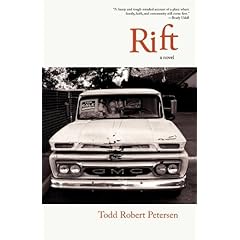 Title: Rift
Title: RiftAuthor: Todd Robert Petersen
Originally published at Blog Segullah.
I'm a city girl. I grew up in the great Northeastern megalopolis where it's possible to drive for six or eight hours along Interstate 95 without seeing evidence of the existence of rural America. During my BYU years, I looked down my nose with derision at the wrangler-wearing Animal Science majors, and viewed any part of the state of Utah south of Provo (with the exception of the national parks and Cedar City during the Shakespeare Festival) as one giant speed trap saddled with an unfortunate accent.
Somehow, I managed to fall in love with a boy from Springville whose ancestors hail from Sanpete County. Once we left Utah, he spent the next decade learning to say "field" instead of "fild," and we got regular updates about life back home in the land south of Provo, complete with Sunday drives to Fairview to decorate graves and picnic on the grounds at the Manti temple.

Todd Robert Petersen's novel, Rift, takes place in the fictional town of Sanpete, which he describes as "ringed on all sides by mountains. It had no interstate and no quick way to get to one. Other towns in the valley had junior colleges or BLM offices, but the town of Sanpete was frozen somewhere between between 1965 and 1972...." It's a town where the lone sheriff's deputy addresses people by name when he turns on the lights in his patrol car to pull them over, where the three-chair barbershop is the local hangout for the retired set, and where the buck stops with Bishop Darrell Bunker (whose counselor, incidentally, is named Bud Miner, and just may be my husband's fictional second-cousin).
Jens Thorsen, Rift's crotchety-but-eventually-endearing hero, has been engaged in a decades-long feud with Bunker, which apparently began when Bunker returned a broken drill to Thorsen (it wasn't broken when Thorsen loaned it to him, it just shorted out occasionally). The two men seem to delight in getting each other goats (figuratively, I didn't read of any goats in the story, just lots of horses, sheep and dead crows). The strife escalates from petty annoyances like tracking mud across kitchen floors and "borrowing" heavy equipment, to the arena of the heart when Bunker's daughter returns from "up North" and turns to Thorsen for help when she doesn't get what she wants from her father.
The novel won the Marilyn Brown novel award, and when I interviewed Brown last year, she said that the purpose of starting the award was to "encourage [Mormon] writers to write about themselves in the best language and artistic structure possible.” Petersen's novel is worthy of the award, with great descriptive writing ("Only a day had passed since Thorsen's showdown with Bunker, but in that time, talk volleyed furiously across back fences and shopping carts and checkout counters. It had come into restaurant tables on serving trays, and it left the hardware store in bags of concrete and roofing nails... By sundown the valley had been slathered in gossip."). Jens Thorsen is likely my very favorite character in Mormon fiction, including The Backslider's Frank Windham, who reminds me in some ways of a very young Thorsen. On one hand, he manages to hold a grudge for decades, grumbles at his wife, evades the police and buys cigarettes for a ward member, but on the other hand, he spends his days engaged in good works for the Jewish "gentile" doctor, an elderly nonmember couple, and others who have been cast off from Sanpete society.
I've read a lot of books about women in small towns banding together to fight ignorance (like this year's The Help) and women in religious communities fighting gossip and small-mindedness (like The Ladies' Auxiliary), but one of the things I love best about Rift is that it's a book about close male friendships, and men engaged in good works. Petersen's debut novel is a beauty, and Jens Thorsen is a character who will stay in my mind, and make me think twice about the people who live in the small towns of southern Utah as I drive through them on my way to Bryce or Zion.
2 comments:
Shelah, I was catching up on some of your Segullah posts and this one really resonated with me. While I always enjoy the short stories and poetry in Dialogue and Segullah, I've never felt inspired enough to give a "Mormon" novel a try. I think you've convinced me to try this one. Several things you write about it have a lot of appeal to me.
For one thing, the Sanpete valley is near and dear to my heart. I, unfortunately, don't have any family ties there, but I like to visit. My master plan was to propose to Jen up on Skyline Drive, but that was foiled (long story). When we were out in October Jen and I spent an afternoon in the Sanpete Valley, and spent a couple hours in the Fairview Museum. In general I find most Southern Utah towns to be very charming and many of them have a surprisingly refined grasp of their culture and heritage.
The author's comment about presenting rural Americans as sophisticated characters also resonated with me. There is an excellent law review article about the phenomenon of "Ruralism", in which the author chronicles the American urban bias in terms of stereotypical attitudes against rural America and their real, quantifiable, socio-economic and legal impacts.
Plus, I think I mentioned this over at FMH during Manuary, I love a good story about male friendships.
Anyway, this is probably way more than you have time for but I wanted you to see how inspiring your review was. Thanks!
I think you'll really like it, Mike. You know, you really should give The Backslider a chance too.
Post a Comment